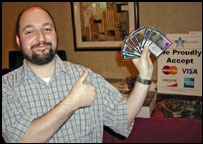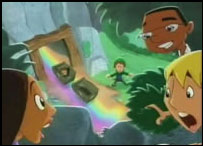At last, the world knows the alleged truth.
Last Monday, an employee of Wizards of the Coast informed us at Good Gamery of the purpose of Magic: The Gathering — the hidden underlying plot that has come to fruition before our very eyes.
 The source, to remain anonymous, claims that Magic: The Gathering, from the very beginning, was a scheme to create a lottery that would be legal around the world, and for participants of any age.
The source, to remain anonymous, claims that Magic: The Gathering, from the very beginning, was a scheme to create a lottery that would be legal around the world, and for participants of any age.
What is a lottery? To help inform our readers, we at Good Gamery wrote an entire Wikipedia article on lotteries. But to make a long story short, lotteries are systems in which participants buy a chance at winning an amount of money less than the expected total contribution from all of the participants.
In most countries, lotteries are illegal except when sponsored or heavily regulated by the state.
But not anymore.
“By disguising our lottery game under a cloak of various subgames, we created a sort of ‘Trojan horse,” the source said. “Troy is the world.”
“And Paris of Troy represents lawmakers, who stole from us the right to extract money from anyone we wish — this, of course, is analogous to Helen,” he went on to explain. “For we are Menelaus, king of Sparta.”
“This is Sparta,” he added, making a sweeping gesture across his office.
 Revelation of the plan was first implied by whistleblower Ben Bleiweiss, writer for Star City Games, who noticed in a recent article that the prices for rares in general are falling, but prices for the few essential, chase rares are skyrocketing.
Revelation of the plan was first implied by whistleblower Ben Bleiweiss, writer for Star City Games, who noticed in a recent article that the prices for rares in general are falling, but prices for the few essential, chase rares are skyrocketing.
“If these trends continue,” say Good Gamery’s resident economics experts, “nearly all booster packs will yield cards worth nothing. But one pack in two million will yield an artifact creature that costs 1, has shroud, and is an 8/8 flier with lifelink and no drawbacks.”
“Think Tarmogoyf for $100 is bad? Try Armageddogoyf for $1,000,000.”
And it gets worse.
 Because all kids are stupid, state-sanctioned lotteries refuse participation by minors, screwing over only those who had quite enough time to unstupify, but failed to do so.
Because all kids are stupid, state-sanctioned lotteries refuse participation by minors, screwing over only those who had quite enough time to unstupify, but failed to do so.
But this de facto lottery does no such thing.
“What’s next?” our experts asked in an alarming tone. “Advertising cereal to children in a way that makes them believe eating it will transport them into a manic, hallucinatory cartoon?”